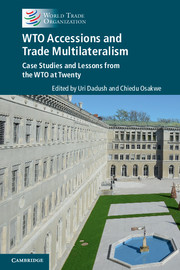Book contents
- Frontmatter
- Dedication
- Contents
- List of contributors
- Foreword
- Acknowledgements
- List of abbreviations
- Editors' note
- PART I WTO accessions, the trading system and the global economy
- PART II Overview: systemic outcomes from accessions
- PART III Members’ perspectives on accession negotiations
- Original members
- Article XII members
- 16 The 2001 WTO accession of China: negotiating experience – challenges, opportunities and post-accession approaches
- 17 The 2001 WTO accession of the Separate Customs Territory of Taiwan, Penghu, Kinmen and Matsu: negotiating experience – challenges, opportunities and approaches post-accession
- 18 The 2004 WTO accession of Cambodia: negotiating priorities and experience – growth and integration eleven years later
- 19 The 2008 WTO accession of Ukraine: negotiating experience – challenges, opportunities and post-accession approaches
- 20 The year 2012: WTO accession of Montenegro – why did we apply to join? Priorities and results
- 21 The 2012 WTO accession of Russia: negotiating experience – challenges, opportunities and post-accession approaches
- 22 The 2013 WTO accession of Lao PDR: specific commitments and the integration of least-developed countries into the global economy
- 23 The 2013 WTO accession of Tajikistan: experience of a landlocked economy in a changing regional economic configuration
- 24 The 2014 WTO accession of Yemen: accession negotiations as an instrument for domestic reform, national security and international cooperation
- PART IV Working party chairpersons’ perspectives on accession negotiations
- PART V Salient features inWTOAccession Protocols
- PART VI Conclusion
- Annex: Contributor biographies
- Index
- Plate section
22 - The 2013 WTO accession of Lao PDR: specific commitments and the integration of least-developed countries into the global economy
from Article XII members
Published online by Cambridge University Press: 05 November 2015
- Frontmatter
- Dedication
- Contents
- List of contributors
- Foreword
- Acknowledgements
- List of abbreviations
- Editors' note
- PART I WTO accessions, the trading system and the global economy
- PART II Overview: systemic outcomes from accessions
- PART III Members’ perspectives on accession negotiations
- Original members
- Article XII members
- 16 The 2001 WTO accession of China: negotiating experience – challenges, opportunities and post-accession approaches
- 17 The 2001 WTO accession of the Separate Customs Territory of Taiwan, Penghu, Kinmen and Matsu: negotiating experience – challenges, opportunities and approaches post-accession
- 18 The 2004 WTO accession of Cambodia: negotiating priorities and experience – growth and integration eleven years later
- 19 The 2008 WTO accession of Ukraine: negotiating experience – challenges, opportunities and post-accession approaches
- 20 The year 2012: WTO accession of Montenegro – why did we apply to join? Priorities and results
- 21 The 2012 WTO accession of Russia: negotiating experience – challenges, opportunities and post-accession approaches
- 22 The 2013 WTO accession of Lao PDR: specific commitments and the integration of least-developed countries into the global economy
- 23 The 2013 WTO accession of Tajikistan: experience of a landlocked economy in a changing regional economic configuration
- 24 The 2014 WTO accession of Yemen: accession negotiations as an instrument for domestic reform, national security and international cooperation
- PART IV Working party chairpersons’ perspectives on accession negotiations
- PART V Salient features inWTOAccession Protocols
- PART VI Conclusion
- Annex: Contributor biographies
- Index
- Plate section
Summary
ABSTRACT
When Lao PDR applied for membership of the WTO in 1997, it used the WTO accession process as a tool to implement its decision to establish a market economy and fully integrate into the world economy. Although at the outset market access was not considered to be the principal benefit to be derived from WTO accession, Lao PDR was aware that WTO membership would give its economy additional security and predictability. WTO accession negotiations allowed Lao PDR to apply international best practices and to align its trade policy with the principles of non-discrimination and transparency. Adaptation to international trade requirements is a longer-term challenge, and post-accession challenges remain, but the benefits are significant and worthwhile.
This chapter is aimed at identifying the lessons learned for accession negotiations in the future, based on the experience of the Lao People's Democratic Republic (Lao PDR). The ultimate purpose is to contribute to strengthening the WTO system, in particular for the accession of least-developed countries (LDCs). The key questions addressed are as follows:
• Why did Lao PDR apply for WTO accession and what priorities did we set as a country?
• Domestically, how were the negotiations organised and what challenges were faced?
• What lessons did we learn?
• What specific benefits have emerged and are emerging from our WTO accession?
Lao PDR applied for membership of the WTO in 1997, the same year it joined the Association of the Southeast Asian Nations (ASEAN). The working party on the accession of Lao PDR was established in February 1998. The General Council approved the country's Accession Package in October 2012 and Lao PDR officially became the 158th member of the WTO on 2 February 2013, after its Instrument of Acceptance was ratified and deposited with the WTO Director-General. Throughout the fifteen years of preparation and negotiations, Lao PDR enacted over ninety laws and regulations both new and amended to bring them in line with WTO rules. These laws cover a wide range of areas including trading rights, import licensing, customs valuation, investment, sanitary and phytosanitary (SPS) measures, technical barriers to trade (TBT), services and intellectual property rights. As an LDC, Lao PDR's application was covered by the guidelines for accelerating LDC accessions.
- Type
- Chapter
- Information
- WTO Accessions and Trade MultilateralismCase Studies and Lessons from the WTO at Twenty, pp. 545 - 557Publisher: Cambridge University PressPrint publication year: 2015
- 1
- Cited by

